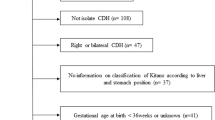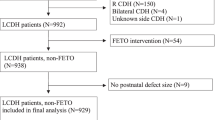Abstract
Objective:
To evaluate if the delivery mode of infants with prenatally diagnosed congenital diaphragmatic hernia (CDH) affects the outcome.
Study design:
Data from the CDH Study Group database of infants with prenatal diagnosis between 2001-2015 were divided into four delivery mode groups: vaginal spontaneous, vaginal induced, elective caesarean section, and emergent caesarean section. Outcomes were analyzed in relation to the time of day of delivery and the gestational age at birth.
Results:
A total of 3906 cases of prenatally diagnosed CDH were assessed, with an overall survival of 64%. There were no differences in patient characteristics, requirement for extracorporeal membrane oxygenation, length of hospital stay or intubation, requirement for O2 at 30 days or overall survival. The time of day at birth did not affect the outcome. There was no difference in outcome between the different delivery modes at similar gestational age (GA) at birth, with worse outcomes at lower GA.
Conclusions:
Neither the mode nor time of delivery seems to affect the overall outcome for patients with prenatally diagnosed CDH. Outcome is strongly associated with the GA at birth.
This is a preview of subscription content, access via your institution
Access options
Subscribe to this journal
Receive 12 print issues and online access
$259.00 per year
only $21.58 per issue
Buy this article
- Purchase on Springer Link
- Instant access to full article PDF
Prices may be subject to local taxes which are calculated during checkout

Similar content being viewed by others
References
Akinkuotu AC, Cruz SM, Abbas PI, Lee TC, Welty SE, Olutoye OO et al. Risk-stratification of severity for infants with CDH: prenatal versus postnatal predictors of outcome. J Pediatr Surg 2016; 51 (1): 44–48.
Coughlin MA, Werner NL, Gajarski R, Gadepalli S, Hirschl R, Barks J et al. Prenatally diagnosed severe CDH: mortality and morbidity remain high. J Pediatr Surg 2015; 51 (7): 1091–1095.
Reiss I, Schaible T, van den Hout L, Capolupo I, Allegaert K, van Heijst A et al. Standardized postnatal management of infants with congenital diaphragmatic hernia in Europe: the CDH EURO Consortium consensus. Neonatology 2010; 98 (4): 354–364.
Safavi A, Lin Y, Skarsgard ED, Canadian Pediatric Surgery N. Perinatal management of congenital diaphragmatic hernia: when and how should babies be delivered? Results from the Canadian Pediatric Surgery Network. J Pediatr Surg 2010; 45 (12): 2334–2339.
Mills JL, Lin Y, MacNab YC, Skarsgard ED, Canadian Pediatric Surgery N. Does overnight birth influence treatment or outcome in congenital diaphragmatic hernia? Am J Perinatol 2010; 27 (1): 91–95.
Frenckner BP, Lally PA, Hintz SR, Lally KP, Congenital Diaphragmatic Hernia Study G. Prenatal diagnosis of congenital diaphragmatic hernia: how should the babies be delivered? J Pediatr Surg 2007; 42 (9): 1533–1538.
Stevens TP, van Wijngaarden E, Ackerman KG, Lally PA, Lally KP, Congenital Diaphragmatic Hernia Study G. Timing of delivery and survival rates for infants with prenatal diagnoses of congenital diaphragmatic hernia. Pediatrics 2009; 123 (2): 494–502.
Tsao K, Allison ND, Harting MT, Lally PA, Lally KP . Congenital diaphragmatic hernia in the preterm infant. Surgery 2010; 148 (2): 404–410.
Author information
Authors and Affiliations
Corresponding author
Ethics declarations
Competing interests
The authors declare no conflict of interest.
Additional information
Supplementary Information accompanies the paper on the Journal of Perinatology website
Supplementary information
Rights and permissions
About this article
Cite this article
Burgos, C., Frenckner, B., Luco, M. et al. Prenatally diagnosed congenital diaphragmatic hernia: optimal mode of delivery?. J Perinatol 37, 134–138 (2017). https://doi.org/10.1038/jp.2016.221
Received:
Revised:
Accepted:
Published:
Issue Date:
DOI: https://doi.org/10.1038/jp.2016.221
This article is cited by
-
Preoperative Management of Congenital Diaphragmatic Hernia
Current Treatment Options in Pediatrics (2022)
-
Optimal timing of delivery for pregnancies with prenatally diagnosed congenital diaphragmatic hernia: a propensity-score analysis using the inverse probability of treatment weighting
Journal of Perinatology (2021)
-
Risk factors for mortality in infants with congenital diaphragmatic hernia: a single center experience
Wiener klinische Wochenschrift (2021)
-
The Pediatric Surgeon’s Role in Prenatal Counseling
Current Treatment Options in Pediatrics (2017)



